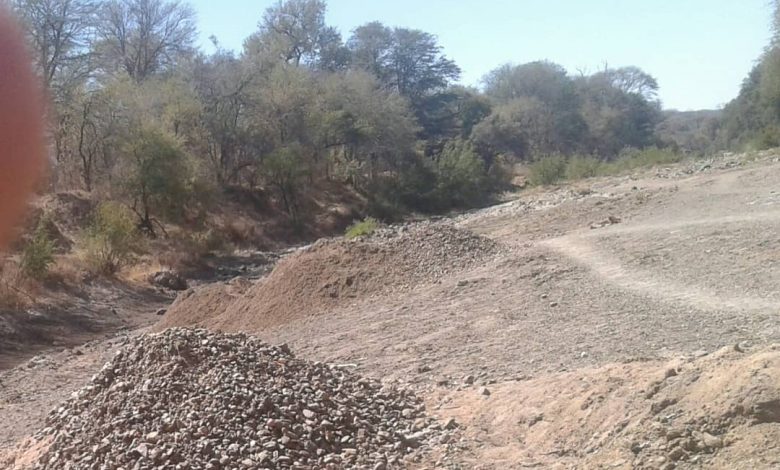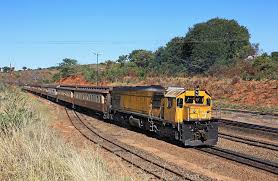Gold rush near Gwayi-Shangani Dam threatens Bulawayo’s mooted water source

By Nokuthaba Dlamini
A gold rush on the confluence of the Gwayi and Shangani rivers is posing a major threat to the long-awaited Matabeleland Zambezi Water Project (MZWP) amid fears of massive pollution.
The Gwayi-Shangani Dam, which has been under construction for several years, is expected to form the main component of the ambitious project to draw water from the Zambezi River to supply Bulawayo.
Investigations by CITE, however, revealed that the project might suffer a stillbirth if the authorities do not move in swiftly to stop alluvial gold mining on the banks of the Gwayi and Shangani rivers in Matabeleland North.
Gold panners from across the country are said to have descended on the area close to the Gwayi-Shangani Dam sites after huge gold deposits were discovered soon after the government imposed a national lockdown to slow down the spread of Covid-19 in March.
The gold deposits were allegedly first discovered by employees of Chinese contractors at the dam site.
Hundreds of people have been trekking to the area within Binga district much to the chagrin of the local community, which fears that their water sources are already polluted with dangerous chemicals such as mercury.
The fortune seekers are from as far as Hwange, Dete, Lupane, Binga and Bulawayo.
“We learnt that there were gold deposits in this area through workers from China International Water and Electric Corporation, who are constructing the Gwayi-Shangani Dam around the time the Covid-19 lockdown began,” said one of the illegal miners, who requested to remain anonymous.
“A lot of people in this area are poor and when news about the gold discovery started filtering in, everyone ventured into mining.
“The business has been good to me. I have since managed to buy two cows and five goats from the money that l earn here.”
Edmond Sibanda, a community leader in Lubimbi, said the mining activities were threatening the main source of water for thousands of people living along the two rivers.
“People are trying to eke out a living through the mining activities, but they are doing more harm to the environment than good,” Sibanda warned.
“Hundreds of these miners travel all the way from Lupane, Dete and Hwange.
“Even Binga villagers have joined the scramble for gold and they are causing irreparable damage to the environment.
“People from Lusulu to Lubimbi and Kamativi get their water supplies from the Shangani and Gwayi rivers.
“We understand that these miners have a ready market from gold dealers, who travel all the way from Harare and Bulawayo.”
Sibanda said besides threatening water sources for villagers, the mining activities posed a serious danger to wildlife and livestock, which would be wiped out by the contaminated water.
The Gwayi area is rich in wildlife and conservationists say mooted coal mining projects are already threatening the fragile ecosystem.
Illegal gold mining activities that are said to be spreading rapidly will give conservationists fresh headaches.
Never Simankali from Mavele village claimed that since the mining activities began, they had seen more fish dying and they feared the deaths were caused by cyanide and mercury, which is used by the panners.
“We would have loved a situation where everything was done legally and with consideration for wildlife, humans and our livestock,” Simankali said.
“Last week l came across a pile of dead fish on the bank of Shangani River and l suspect their deaths were due to the contamination of water.
“The water has since turned green.”
Tongai Ncube, another community leader in Lubimbi, said the construction of the Gwayi-Shangani Dam had brought hope that the impoverished area will get some economic spin-offs and alleviate poverty.
Ncube said already villagers were benefiting through agriculture and fishing projects, but the gold rush was likely to snuff out the ventures as the water from the dam would be polluted.
“We gather that the Chinese, who are constructing the dam are the same people behind this gold rush,” he claimed.
“Some locals, who are involved in Illegal mining activities are actually hired by the Chinese.
“The damage they are causing to the environment could be felt as far as Bulawayo as the Gwayi-Shangani Dam is meant to supply the city with water.”
Kezia Ncube from Bira village said the gold discovery was turning out to be a curse for locals.
“We are not benefitting anything from this gold, but instead the mining activities have brought untold suffering for us,” Kezia lamented.
“We are worried that during the rain season there would be massive siltation of the rivers and we will struggle to get clean water.”
Matabeleland North resident minister Richard Moyo told CITE that although he was not aware of the gold rush, the government will take action.
“We will be sending the Environment Management Authority to the area where these activities are said to be taking place in order to restore order and sanity,” Moyo said.
He said villagers that wanted to venture into mining should register with the relevant authorities.
“What they are doing is very unscrupulous and if they want to do mining, they should be registered,” Moyo added.
“But at the moment the government is not issuing any licences for anyone to mine on river banks.
“If the Chinese contractors are found to be involved in the Illegal activities, action would be taken against them.”
A fortnight ago the government banned mining activities in game parks and river bankers following an outcry over two Chinese coal miners that were given special grants inside Hwange National Park.
The construction of Gwayi-Shangani Dam, which represents the first phase of the MZWP, began almost a decade ago.
Competition of the dam wall has been continuously delayed by lack of funding.
Bulawayo’s perennial water shortages are becoming dire with supply dams drying up.
The MZWP, which was first mooted in 1912, is viewed as the long solution to the city and Matabeleland region’s water woes.






